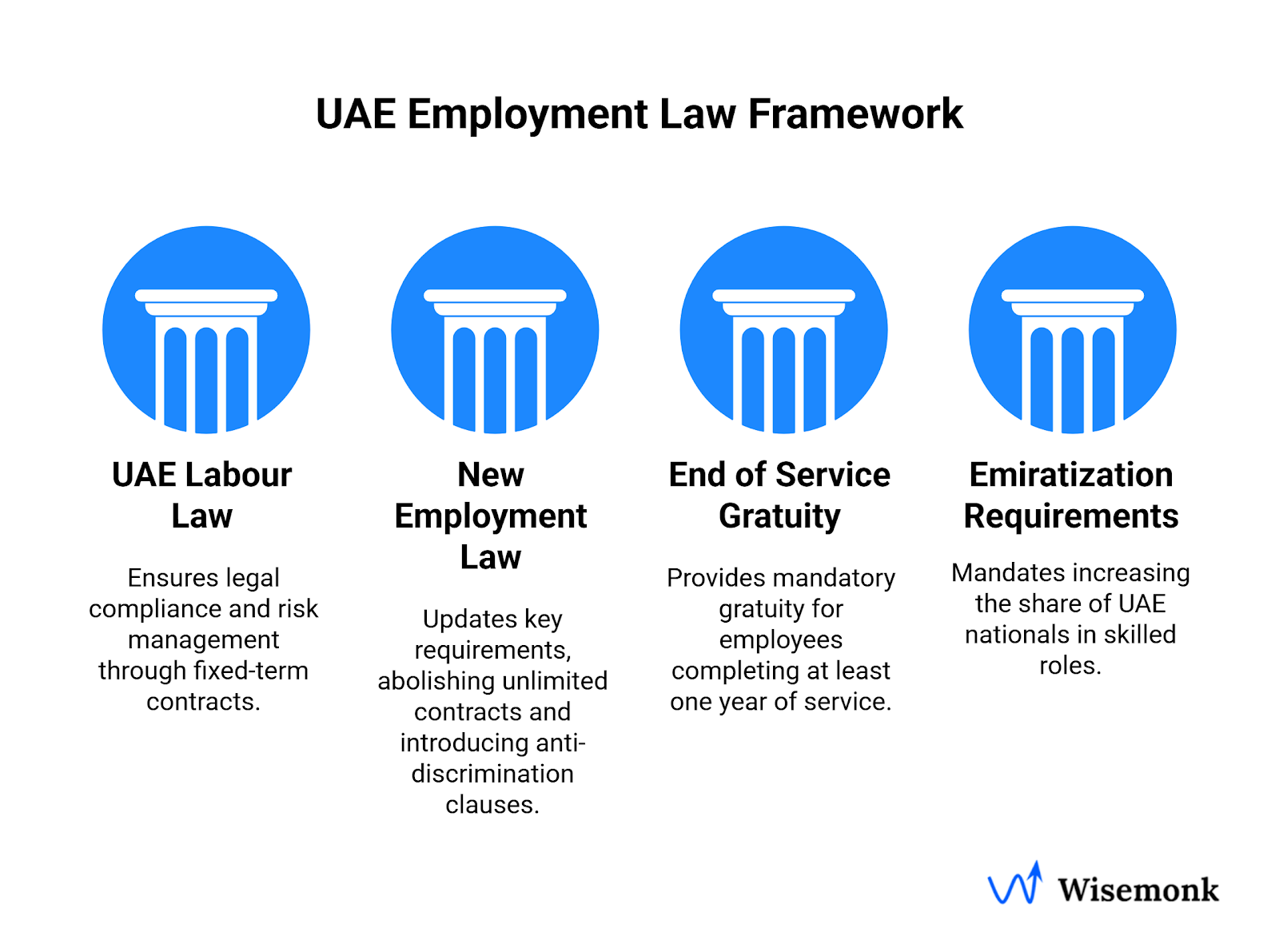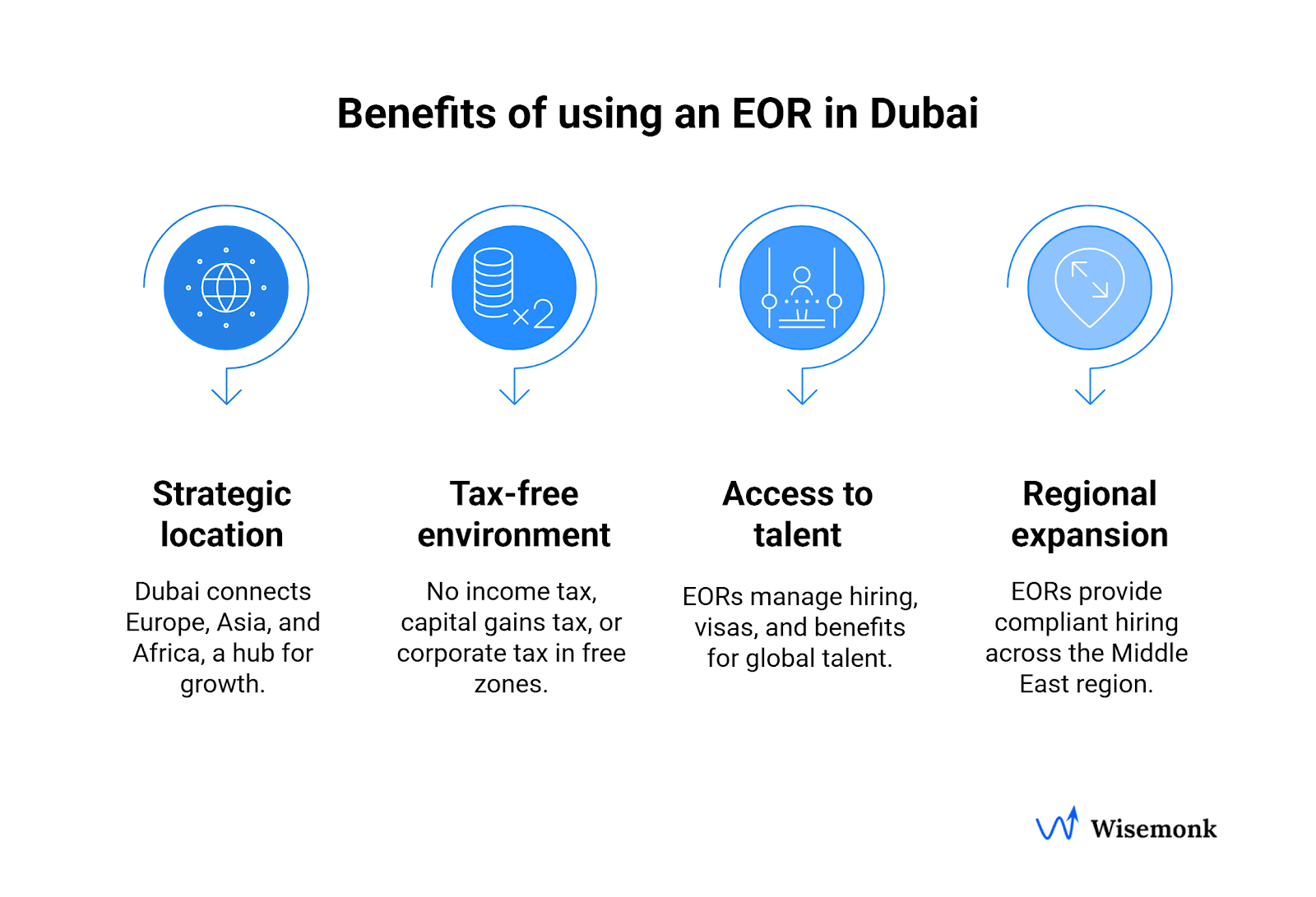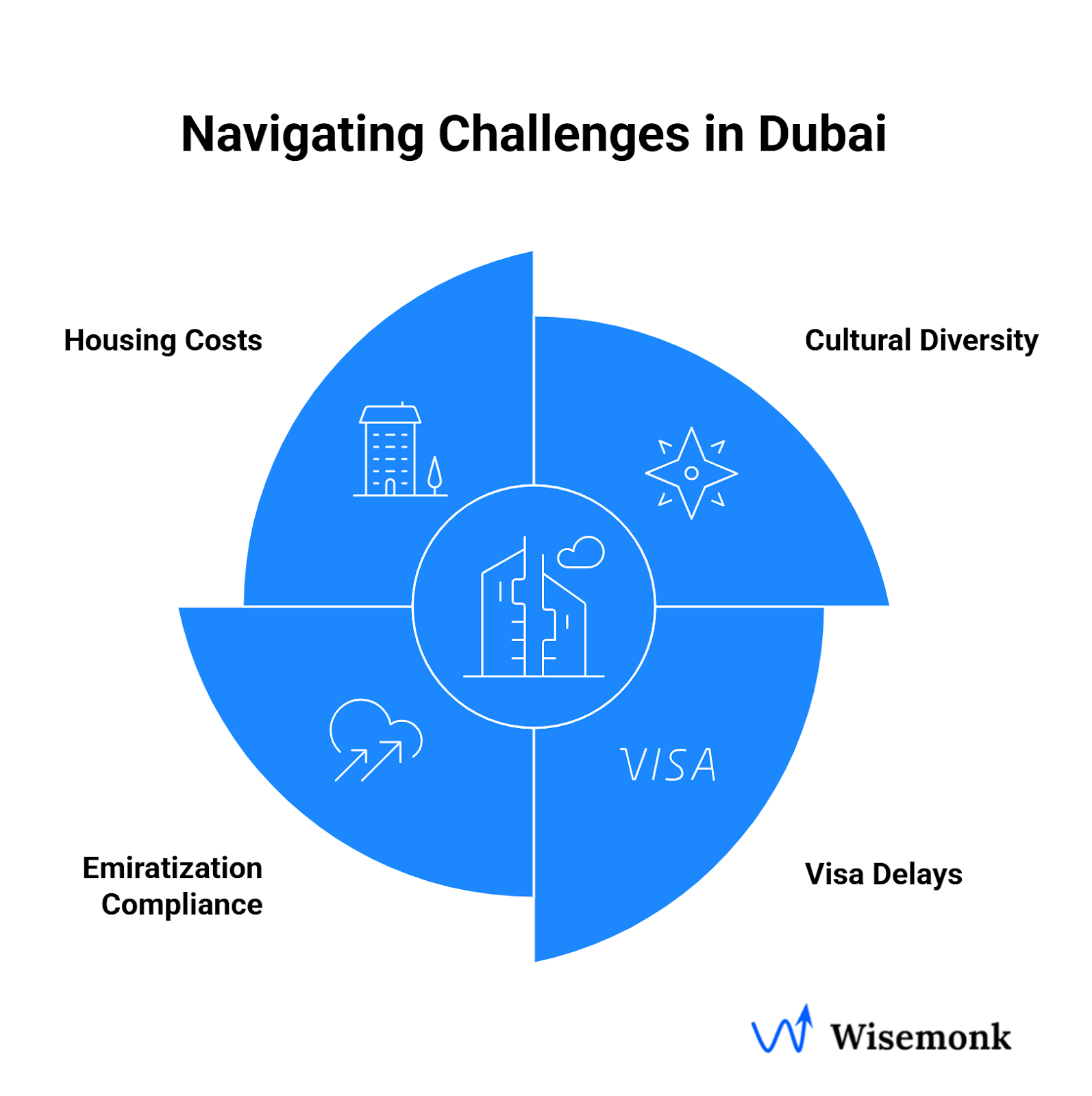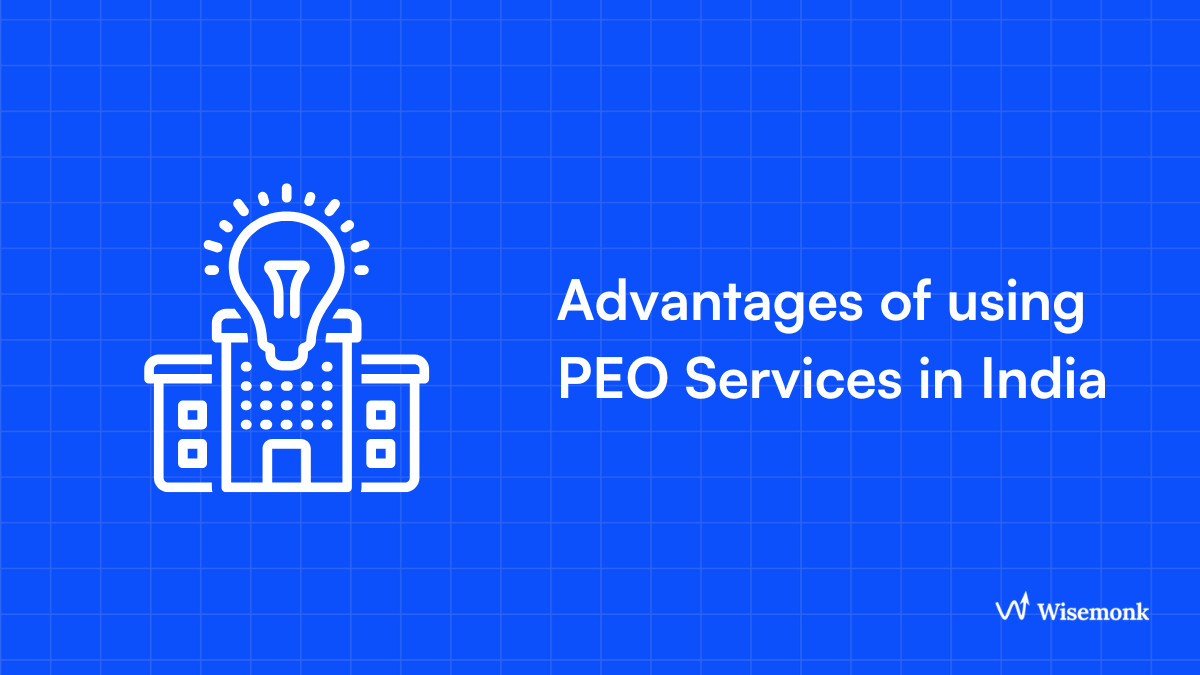Looking to hire or expand your team in Dubai but don’t want the hassle of setting up a local entity? An employer of record in Dubai might be exactly what you need. In our experience, we have seen that using EOR services in Dubai enables companies to confidently hire employees, stay compliant with UAE labor law, and manage their global workforce with ease. As Dubai cements its status as a global business hub, attracting foreign investors and global employees alike, the demand for seamless, compliant, and strategic hiring solutions is growing rapidly. Let’s explore how an EOR can simplify your Dubai hiring strategy while helping you navigate local laws, wage protection systems, and business operations in the United Arab Emirates.
What is the UAE employment law framework for businesses hiring in Dubai?[toc=Employment Law Framework]
The UAE Labour Law (Federal Decree-Law No. 33 of 2021) provides a clear, compliant structure for employment in Dubai’s private sector and applies to both local entities and foreign businesses.

- UAE Labour Law: All employment must be under fixed-term contracts (up to 3 years, renewable), with job roles, salaries, working hours, and statutory benefits clearly stated to ensure legal compliance and risk management.
- New Employment Law (2022): The law updated key requirements effective February 2022, abolishing unlimited contracts and introducing anti-discrimination clauses, stricter documentation, and expanded protections for foreign employees and UAE nationals.
- End of Service Gratuity: Employees who complete at least one year receive 21 days’ basic wage per year for the first five years and 30 days per year after, capped at two years’ salary, mandatory for expatriate and foreign employees.
- Emiratization Requirements: Companies with 50+ staff must increase their share of UAE nationals in skilled roles by 1% every six months, aiming for 4% by the end of 2025. Non-compliance can bring significant fines and work permit suspensions.
Strict adherence to labor contracts, wage protection systems, and documentation standards ensures compliance, effective HR management, and smooth business operations for both global employers and local entities.
What are the key benefits of using an Employer of Record (EOR) in Dubai?[toc=Key Benefits of Using an EOR]
When global companies look to expand in Dubai or the broader Middle East, choosing an employer of record unlocks enormous advantages, both practical and strategic. Based on our extensive research and hands-on experience, here are the benefits that matter most:

- Strategic Middle East location: Dubai acts as a gateway connecting Europe, Asia, and Africa, making it a prime hub for regional business growth and a natural expansion platform across GCC countries.
- Tax-free environment: Businesses benefit from no personal income tax, zero capital gains tax, and corporate tax exemptions in free zones. Elsewhere, a low 9% corporate tax applies only on profits above AED 375,000, allowing companies to retain earnings and attract investment.
- Access to global talent: EORs manage visas, employment contracts, and benefits, enabling companies to hire both local and international talent efficiently without sponsorship complications.
- Regional expansion platform: EORs provide compliant hiring solutions across multiple Middle Eastern countries without the need to establish local legal entities in each market, reducing risks and accelerating regional growth.
Based on our experience, these benefits create agility, ensure compliance with UAE labor and tax laws, and provide a strong foundation for companies expanding into Dubai and the wider Middle East.
How does payroll and tax compliance work with an Employer of Record (EOR) in Dubai?[toc=Payroll & Tax Compliance]
Handling payroll and taxes correctly is key to staying compliant and avoiding financial risks. Here’s what you should know about managing these with an EOR in Dubai:
- Dubai offers a tax-free salary structure for individuals, with no personal income tax, which simplifies payroll management and boosts employee take-home pay.
- Employers have minimal social security contributions, mainly for UAE nationals, where monthly payments go towards pension schemes. Foreign employees are exempt from social security contributions.
- EORs manage monthly and annual payroll compliance, ensuring wages are paid on time and records meet legal standards, including adherence to the Wage Protection System (WPS), which safeguards salary payments.
- End-of-service gratuity calculations are integrated into payroll, with accurate accruals based on the employee's tenure and basic wage, ensuring lawful termination benefits.
- Using an EOR reduces exposure to legal and financial risks by managing statutory payroll taxes, local labor laws, and payroll documentation.
In our experience guiding foreign companies, partnering with a reputable EOR ensures payroll taxes and compliance are handled seamlessly, allowing businesses to focus on growth rather than administrative burdens.
What employee benefits and entitlements are provided in Dubai?[toc=Employee Benefits & Entitlements]
Dubai’s employment contracts require specific statutory benefits to maintain legal compliance and help attract global employees:
- Annual Leave: Employees are entitled to 30 days of paid annual leave after one year; those with 6–12 months get 2 days per month. Unused leave can be paid out, as per local labor laws.
- Sick Leave: UAE labor law gives up to 90 days per year, first 15 days at full pay, next 30 at half, and the rest unpaid, with a medical certificate required from local entities.
- Maternity & Paternity Leave: Female employees receive 60 days maternity leave (45 days full pay, 15 half), and both parents are entitled to 5 days’ paid parental leave within the first 6 months after birth. These statutory benefits support workforce diversity and compliance in your HR management.
- End of Service Gratuity: Employees with at least one year of service receive 21 days' basic wage per year for the first 5 years and 30 days per year thereafter, capped at two years’ wages. Payment options include a lump sum or a new savings scheme, as outlined in UAE labor regulations.
Employers, especially those using EOR services, must provide these benefits through official HR services and benefits administration to remain fully compliant and support employee satisfaction.
What is the hiring and onboarding process for employees in Dubai?[toc=Hiring & Onboarding Process]
Dubai’s hiring process requires strict adherence to local labor laws and thorough documentation. Here’s what’s essential for legal compliance and smooth onboarding with EOR services and HR management:
- Required Documentation: Valid passport (minimum six months), passport photos, attested certificates, entry permit, and a signed employment contract aligned with UAE labor law and local entity standards.
- Medical Examination: Mandatory health checks at an approved Dubai Health Authority center for infectious diseases before Dubai work permits are approved. Health insurance compliant with Dubai Care must be arranged for all foreign employees.
- Contract Requirements: All employment contracts must be limited-term (up to three years), detail roles, pay, statutory benefits, legal requirements, and termination terms. Unlimited contracts are being phased out per the Emirati labor law.
- Integration Timeline: The onboarding and workforce integration process, completing all labor contracts, Emirates ID, and legal compliance paperwork, typically takes 2–4 weeks with an experienced EOR partner or professional employer organization.
- HR Management: Orientation sessions and benefits administration by the legal employer ensure ongoing compliance with UAE employees' entitlements and wage protection system requirements.
From our experience, working with an EOR partner streamlines each step, ensuring global employees, foreign investors, and foreign companies can onboard employees efficiently while maintaining risk management and legal compliance with UAE labor law and labor relations.
How to effectively manage a diverse workforce in Dubai?[toc=Workforce Management]
Managing employees in Dubai’s global workforce means blending HR management with cultural fluency and legal compliance. With about 90% of the workforce being expatriates, inclusive labor relations, embracing diversity, and clear HR services drive success.
- Multicultural work environment: Cultural awareness training, team-building, and honoring various national holidays foster unity and compliance with local labor laws. Inclusive HR policies aligned with UAE labor regulations promote employee engagement and effective risk management.
- Communication preferences: English is the main business language, but providing information in other languages supports foreign employees and global teams. Emirati professionals often value indirect, harmonious feedback, while expatriates may prefer direct communication. Professional employer organizations and HR partners bridge these differences through training and clear employment contracts.
- Performance management: Setting clear goals, regular feedback, and using KPIs in line with Emirati labor law leads to effective performance evaluations. Transparent wage protection systems and adherence to working hours are essential for legal compliance and payroll management.
- Professional development: Ongoing training, mentoring, and benefits administration help onboard employees, upskill UAE employees, and fulfill national workforce goals. Employee leasing programs, statutory benefits, and career growth are central to a future-ready business operation.
From our HR management experience, prioritizing flexible communication, robust HR services, legal compliance, and diversity unlocks productivity and innovation in Dubai’s dynamic employment landscape.
What are the procedures for employee termination in Dubai?[toc=Termination Procedures]
Terminating employees in Dubai comes with clear steps to protect both sides and keep things compliant. We’ve helped global businesses through these processes many times. Here’s what matters most:
- Limited vs. Unlimited Contracts: Since 2022, most jobs use limited-term contracts (with a set end date), while some older unlimited contracts are still around. Limited contracts end when they expire or with proper cause. Unlimited contracts can be ended by either party if they give the right notice.
- Notice Requirements: Employees are owed at least 30 days’ notice, and contracts can specify up to 90 days. During probation, it’s a 14-day notice (if the employer initiates) and 30 days for employee resignations. Only in serious cases, like misconduct, can someone be terminated without notice, following legal procedure.
- Gratuity Calculations: After a year of service, employees get an end-of-service gratuity: 21 days’ basic wage per year for the first five years, then 30 days for every year after, capped at two years’ pay. All dues, unused leave, and the gratuity must be paid within 14 days of termination.
- Legal Risk Mitigation: Document everything. Clearly outline reasons for dismissal, provide required paperwork (like release letters and end-of-service statements), and settle all dues quickly. Unfair or unjustified termination can bring legal or financial trouble, so following due process keeps everyone protected.
From our experience, a fair, transparent, and well-documented process is essential, not just for legal compliance but for maintaining trust and reputation in Dubai’s close-knit business community.
What’s involved in cost analysis and financial planning for an Employer of Record (EOR) in Dubai?[toc=Cost Analysis & Financial Planning]
Budgeting for an EOR in Dubai means factoring in fees, legal benefits, and the real value you get compared to setting up your own entity. Here’s a quick breakdown based on the most updated sources and our experience guiding global companies:
- EOR Service Pricing Models: Most EORs in Dubai charge a fixed monthly fee per employee, generally ranging from $500–$1,200 (AED1,800–4,400), depending on your provider and service level. Some offer percentage-based fees, usually 8–15% of each salary. Premium packages with HR add-ons or compliance support may cost more.
- Gratuity Provisions: End-of-service gratuity is mandatory for all non-national employees. This is 21 days’ basic salary per year of service for the first five years, and 30 days for each year after, capped at two years’ salary. You must budget for this liability and ensure it’s paid within 14 days of contract end, with options for lump-sum or contribution to a savings scheme.
- Benefits Budgeting: Employers must provide at least basic health insurance and legally required leave. These, plus gratuity, typically take up 10–15% of your total payroll spend. Many EORs include benefits administration in their package, helping you stay compliant and competitive.
- ROI Calculations: EOR fees are highly predictable and often much lower than the ongoing cost of setting up and maintaining your own UAE entity. Companies usually save on up-front incorporation costs, reduce legal risks, and speed up hiring, which means a faster return on investment. In many cases, EORs save up to 25–40% versus traditional setups and help you avoid costly HR and regulatory pitfalls.
From our experience, companies that budget for all these elements and review them regularly see the best results and fewest financial surprises when using an EOR in Dubai.
What are the common challenges in Dubai, and how can you overcome them?[toc=Challenges]
Dubai offers great opportunities but also some hurdles. Here’s a quick look at typical challenges and practical solutions based on our experience with EOR services and HR management:

- Cultural Diversity: Language and cultural differences within the multicultural workforce can cause misunderstandings. Cultural training, team-building, and inclusive HR policies help turn diversity into a strength. Celebrating cultural events boosts trust, engagement, and better labor relations.
- Visa Delays: Most Dubai work permits and employment visas are issued in 2–7 days, but delays happen during peak times or due to incomplete legal documents. Preparing paperwork early and using fast-track visa services minimizes disruption and helps maintain compliance with UAE labor laws.
- Emiratization Compliance: Meeting Emirati labor law quotas (7% in skilled roles by 2025) is mandatory to avoid fines. Stay compliant by hiring qualified UAE nationals, maintaining accurate employment contracts, avoiding false reporting, and partnering with trusted EOR partners for seamless workforce management.
- Housing Costs: Rent and living expenses can be high in Dubai. Employers can assist by offering relocation support, housing allowances, or flexible benefits administration to attract and retain top talent, improving employee satisfaction and reducing turnover.
This approach helps foreign businesses and global employees navigate Dubai’s unique challenges while maintaining legal and financial risk management.
Conclusion[toc=Conclusion]
Success in Dubai means managing cultural diversity, visa processing, Emiratisation compliance, and living costs while following local labor laws and employment contracts. A trusted EOR partner, your legal employer, handles payroll services, benefits administration, and legal compliance, letting foreign businesses hire employees and manage a global workforce without setting up a local entity. Clear processes and strong local relationships ensure smooth, compliant expansion in the UAE.
Ready to expand your global workforce quickly and compliantly? Partner with Wisemonk’s Employer of Record services to effortlessly manage hiring, payroll, and compliance, so you can focus on growing your business with confidence.
Frequently asked questions
What is the difference between limited and unlimited contracts?
A limited contract has a fixed end date under UAE labor law, while an unlimited contract offers flexibility with no fixed term and can be terminated by either party following local labor laws and notice requirements.
How is end-of-service gratuity calculated?
End-of-service gratuity is calculated based on UAE employment contracts as 21 days’ basic salary per year for the first five years and 30 days for each additional year, capped at two years’ total wage, in line with UAE labor regulations.
What are the Golden Visa requirements?
The UAE Golden Visa grants long-term residency to foreign employees, investors, and entrepreneurial talents who meet criteria such as investment thresholds or business ownership, supporting foreign businesses and global employees.
How does Emiratisation affect hiring?
Emiratisation requires companies to hire a minimum percentage of UAE nationals in their workforce, influencing labor contracts and local labor laws to meet government-mandated quotas and promote employment benefits for UAE citizens.
What are the visa processing times?
Dubai work permits and employment visas typically process within 3–6 working days, though processing times can vary based on document compliance with UAE labor regulations and local entity requirements.
How much does it cost to get an Employer of Record (EOR) in 2025?
EOR costs typically range from $199 to over $2,000 per employee per month, depending on the country, services offered, and provider. Fees may be flat or a percentage of payroll (5–25%), and can include setup, benefits, and currency conversion charges.
Is WPS mandatory in Dubai?
Yes, all employers registered with the Ministry of Human Resources and Emiratisation (MoHRE) must use the Wages Protection System (WPS) to pay employees on time.
.png)

.png)
